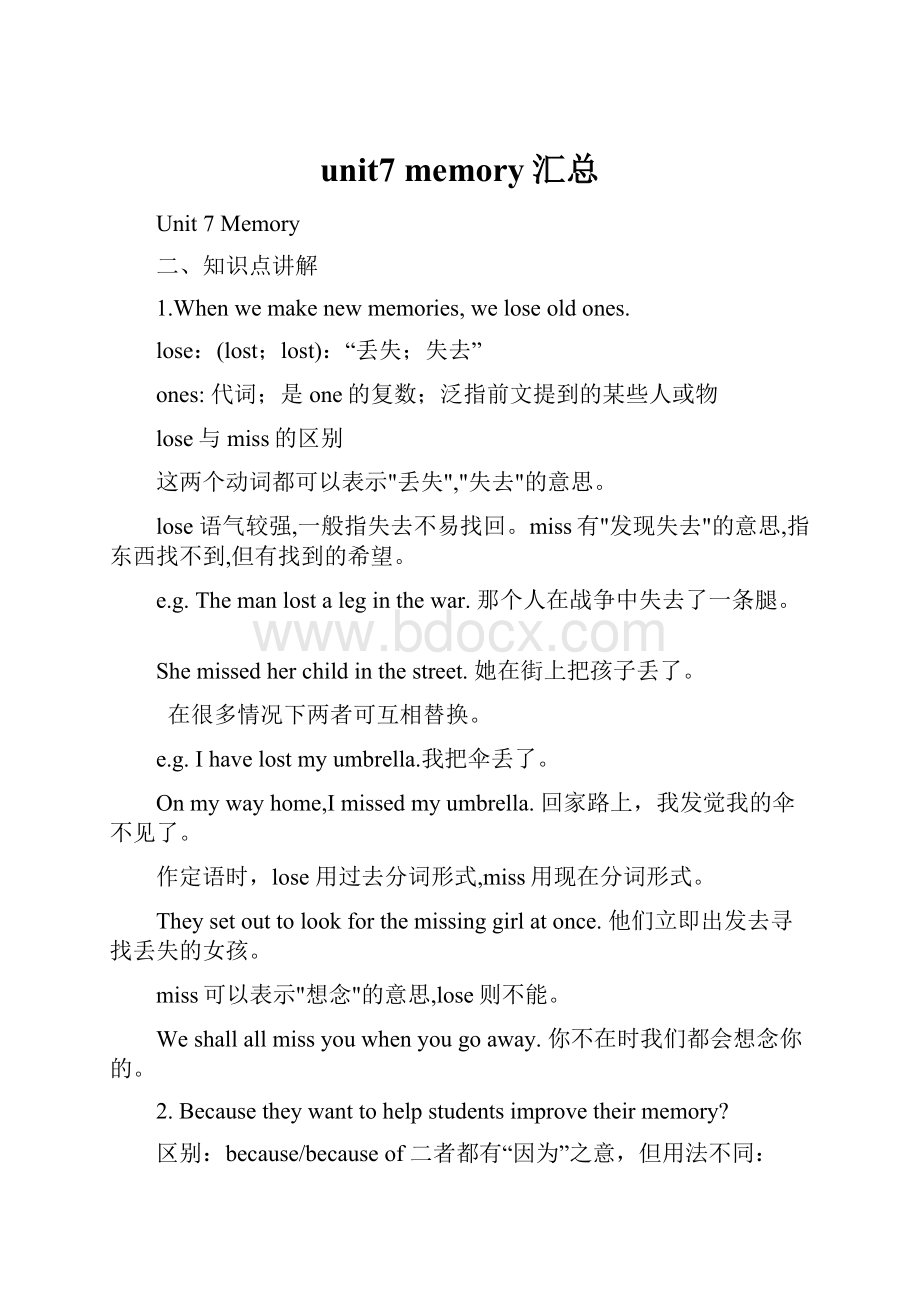unit7 memory汇总.docx
《unit7 memory汇总.docx》由会员分享,可在线阅读,更多相关《unit7 memory汇总.docx(18页珍藏版)》请在冰豆网上搜索。

unit7memory汇总
Unit7Memory
二、知识点讲解
1.Whenwemakenewmemories,weloseoldones.
lose:
(lost;lost):
“丢失;失去”
ones:
代词;是one的复数;泛指前文提到的某些人或物
lose与miss的区别
这两个动词都可以表示"丢失","失去"的意思。
lose 语气较强,一般指失去不易找回。
miss有"发现失去"的意思,指东西找不到,但有找到的希望。
e.g. The man lost a leg in the war. 那个人在战争中失去了一条腿。
She missed her child in the street. 她在街上把孩子丢了。
在很多情况下两者可互相替换。
e.g. I have lost my umbrella.我把伞丢了。
On my way home,I missed my umbrella. 回家路上,我发觉我的伞不见了。
作定语时,lose 用过去分词形式,miss用现在分词形式。
They set out to look for the missing girl at once. 他们立即出发去寻找丢失的女孩。
miss可以表示"想念"的意思,lose则不能。
We shall all miss you when you go away. 你不在时我们都会想念你的。
2.Becausetheywanttohelpstudentsimprovetheirmemory?
区别:
because/becauseof二者都有“因为”之意,但用法不同:
Because+句子,作why开头问句的答语,常用于表示直接原因。
because of+短语。
试比较:
Eg:
Because he is ill,he is absent today.
He can't come because of the heavy rain.
improve:
“改善;提高”;意为make…better
3.Agreatwaytohelpyouremembersomethingistoimagineapictureofitinyourmind.
way相关用法总结
1)waytodosth=wayofdoingsth“做某事的方式”
2)dosthinthis/thatway“以这种或者那种方式做某事”
3)onthewayto“在去什么的路上”(当地点为home,herethere时介词to省略)
4)intheway“挡路”/bytheway“顺便说一下”
imaginev.“想象”;imaginationn.“想象力”;imagine+doingsth;“想象做某事”
4.Iknowyouarebusy,butitworththetime.
bebusywithsth/bebusydoingsth;“忙于某事、忙于做某事”
beworthdoingsth“值得......”
Eg:
Themovieisworthwatching.
5.Ifyouwishtogetagoodjob,therearemanyimportantstepsyoushouldtake.
hope/wish
1)两个词用作动词,均有“希望”的意思,hopetodo/wishtodo两个动词都可接宾语从句。
2)wish后还可用wishsbtodosth但hope不能用
Eg:
I wish you tocome here soon.我希望你尽快来这里。
6.Unlessyougetenoughsleepeverynight,youwillnotrememberthingswell.
连词unless意为“除非…/如果不…”,“除了…”,多引导一个否定意义的真实条件句,有时也可引导非真实条件句。
1)enough用作副同,充当形容词或副词修饰语,但必须后置。
Eg:
He walks slowly enough.
2)enough:
足够的,修饰名词/形容词/副词。
enough位置口诀(名前形副后)
Eg:
There are enough seatsfor them all.
7.Forexampleyoumayhavetroublerememberingthelistsofstepsinthewatercycle.
havetrouble(in)doingsth.“做……有困难”(in可以省略)
getsb....intotrouble“使某人陷入麻烦之中”
beintrouble“处于困境中”
8.Let'stakeabus.
1)let用作使役动词,表示“让”,其用法为letsbdosth,而 let’s 中的’s=us
2)在反意问句中,let's的反意疑问句,用 shall we。
Letus的反意疑问句用willyou。
Eg:
Let’s go swimming together, shall we?
Let us go swimming together, willyou?
3)let’s 的否定式可以是 let’s not/don’t.
Eg:
Let’s not hurry. / Don’t hurry.
9.Whatdoesscientistthinkaboutwordsthatsoundsimilar.
sound“听起来,似乎”,+adj;
similar“相似的;相像的”;其名词形式为similarity;常用词组为besimilarto
10.Ifyoutakeafishoutofwater,itdies.
1)if引导的条件状语从句,表示假设,其结果一定会发生,从句和主句时态都用一般现在时。
Eg:
Ifyouheatice,itturnsintowater.
2)以下四个词均与“死”有关。
①die是终止性动词,意为“死亡”、“断气”,指生命的结束,强调动作。
Eg:
His grandmother died two years ago.
②dead意为“死的”、“无生命的”,常与be动词连用,表示死的状态。
Eg:
He has been dead for two years.
③dying是die的现在分词,通常作形容词使用,表示“要死”、“垂危”、“濒临死亡”。
Eg:
He is dying.
④death是die的名词,意为“死”、“死亡”。
Eg:
It makes me very sad when I think of my little dog's death.
11.Canyougivemeanexample.
givesbsth“给某人某物”;也可改成givesthtosb
常见的双宾动词有:
give,show,send,bring,offer,read,pass,hand,tell,return,write.
give sba call “给……打电话 ” give back “归还,送回”
give out “分发,散发,用光,耗尽 ”
give away “ 泄密” give off “发出(光,烟,气)”
give a hand “伸出援手”
12.Theniteitherforgetsthemorpassesthemintolong-termmemory.
either…or....“或者.....或者;不是....就是”
(当either…or…,neither…nor…,notonly…butalso…等连接主语时.谓语动词的人称和数常常与最近作主语的词语保持一致
语法:
if/unless引导的条件状语从句
If引导的条件状语句
◆◆引导条件状语从句最常用的连词是if。
if引导的条件句有真实条件句和非真实条件句两种(非真实条件句会在以后的虚拟语气中阐述),其引导的真实条件状语从句表示在某种条件下某事很可能发生。
1)如果if条件句讲述自然规律,肯定会发生的事情或客观事实,主句和if从句都用一般现在时态。
(主现从现)
Eg:
Ifyoutakeafishoutofwater,itdies.如果把鱼从水中拿出,它会死。
2) 在if引导的条件状语从句中,谈论将来可能出现的情况时,
主句
一般将来时态
祈使句+if从句(一般现在时态)
情态动词
(主现从现)Ifyouputapieceofpaperintowater,itgetswet.
如果你把一张纸放进水中,它会变湿。
(主将从现)I’llbuyacarifIhaveenoughmoney.
如果我有足够的钱,我会买一辆车。
(主祈从现)Becarefulwhenyoucrosstheroad.过马路时要小心。
Putupyourhandifyouhaveanyquestionstoask.
如果你们有问题要问的话,请举手。
(主情从现)IfIgetthereearly,Icanseethedoctorquickly.
如果我早早地到那里,我就可以快点看病。
【注意】此处if引导的从句,还可由when,assoonas(一…就…),(not)…until(直到…才),unless(除非)来引导。
Eg:
Thetrafficmuststopwhenthelightarered.当红灯亮时,交通必须停止。
Iwillgohomeassoonasitstopsraining.雨一停我就回家。
Pleasedon’tleavetheofficeuntilyourfriendcomesback.
请不要离开直到你朋友回来。
Unless引导的条件状语从句
◆◆unless引导的条件状语从句:
unless=if…not“除非,如果不”
①Let'sgooutforawalkunlessyouaretootired.
=Ifyouarenottootied,let'sgooutforawalk.我们出去散步吧,除非你太累
②Youwillfailtoarrivethereintimeunlessyoustartearlier.
=Ifyoudon’tstartearlier,youwillfailtoarrivethereintime.
如果你不早点动身,你就不能及时赶到那儿。
③Unlessitrains,thegamewillbeplayed.
=Ifitdoesn’train,thegamewillbeplayed.除非下雨,比赛将照常进行。
④Mybabysisternevercriesunlesssheishungry.
=Mybabysisternevercriesifsheisn’thungry.我的妹妹不会乱哭,除非她饿了。
◆◆位置:
由if引导的条件状语从句,可放在主句前面或后面。
Eg:
Ifwegotothebeach,weneedtotakesuncream.
=Weneedtotakesuncreamifwegotothebeach.
如果我们去海滩,我们需要带上防晒霜。
课堂练习
一、用if或unless填空。
1.______hewantstoseeme,youcantellhimtowait,
2.______itsnowstomorrow,we'llhaveadayortwooff.
3.Wewon'tgotohisparty______heinvitesus.
4.Sheissuretopasstheexamination______sheisill.
5.I'lltakethatcomputer______Ihaveenoughmoney.
6.______mygrandmawearsglasses,shecanseebetter.
7.Iwon'tbuythatbackpack______itcostslessthan¥20.
8.______I'mtired,I'llhavearestfortea.
二、用所给词的正确形式填空。
1.Ifhe__________(get)alowmarkinthetest,he__________(study)harder;
2.Ifyou__________(swim)everydaythissummer,you__________(be)veryhealthy.
3.Ifhe__________(nothurry),he__________(notsee)thebeginningofthematch.
4.Youcan'tgooutunlessyou__________(finish)yourhomework.
5.UnlessIsavemymoneycarefully,I__________(notbe)abletobuyafootball.
6.Ifit__________(notrain)tomorrow,we__________(go)tothepark.
7.Ifhe__________(return)totheschool,I__________(let)youknow.
三、句型转换。
1.PeoplegrowcorninthenorthofChina.(改为被动句)
Corn____________________inthenorthofChina.
2.Jimcan’tdecidewhatheshoulddonext.(改为同义句)
Jimcan’tdecide______________________________next.
3.Ittookhimtwohourstoplaywithacomputerlastnight.(改为同义句)
He__________twohours__________withacomputerlastnight.
4.Theyarehappytoseeeachother.(改为感叹句)
____________________theyaretoseeeachother!
5.Everyoneshouldgivebackthesebooksontime.(改为被动句)
Thesebooksshould____________________backontime.
6.Hehasworkedinthisschoolforfiveyears.(就划线部分提问)
____________________hasheworkedinthisschool?
7.Fromthenon,thefoxnolongercametothevillage.(改为同义句)
Fromthenon,thefoxdidn’tcometothevillage____________________.
四、选择题。
()1.Ifyou______totheparty,you’llhaveagreattime.
A.willgo B.went C.go D.going
()2.Whatwillfather______usfromJapan?
A.take B.bring C.carry D.make
()3.Ifyouthewater,itintogas.
A.boil,turnsB.boil,willturn C.willboil,turn D.willboil,willturn
()4.I______hertheanswerifshe______me.
A.cantell,willask B.willtell,willask C.wouldtell,ask D.willtell,asks
()5.--Whatareyougoingtodotomorrow?
--We’llgotothelibrarytomorrowifit______.
A.isn’train B.rain C.won’train D.doesn’train
()6.--Doyouknowwhenhewillcomebacktomorrow?
--Sorry,Idon’tknow.Whenhe______back,I’lltellyou.
A.comes B.willcome C.come D.maycome
()7.Whatwillyoudoifyou______totheoldfolk’shomevisit?
A.go B.went C.going D.willgo
()8.I’llgivethebooktohimifhe______herenextSunday.
A.willcome B.comes C.iscoming D.came
()9.There______anEnglishfilminourschooltomorrow.
A.isgoingtohave B.willhave C.isgoingtobe D.has
()10.Whenmymotherreturnedlastnight,I______ abook.
A.read B.amreading C.wasreading D.amgoingtoread
()11.Iwon’leavehereuntilheback.
A.comeB.comesC.willcomeD.came
()12.I’llwakeyouupwhenhe______back.
A.will B.isgoingtocome C.comes D.come
()13.Shewillcometohelpusifshetoobusytomorrow.
A.isB.isn’tC.willbeD.won’tbe
()14.IfIfindhisphonenumber,Iyou.
A.tellB.toldC.willtellD.havetold
()15.youdon’tgotobedearlier,youwillfeeltiredtomorrow.
A.UnlessB.IfC.ThoughD.Until
课后练习
一、选择题。
()1.--It’sraining,Daisy.Pleaseanumbrellawithyou.
--Thanks.I’llreturnittoyouwhenInextweek.
A.take;comeB.take;willcome
C.bring;comeD.bring;willcome
()2.I’llgoforawalkwithyouifit______tomorrow.
A.won’trainB.doesn’trainC.willrainD.notrains
()3.She______asananimaltrainersince2003.
A.hasworkedB.worksC.willworkD.haveworked
()4.They______hertotheparty,soshewasveryhappy.
A.inviteB.invitedC.willinviteD.areinviting
()5.Mr.Green______tothemanagernow.You’dbettercallhimlater.
A.talkB.talkedC.istalkingD.wastalking
()6.Ifyou______carefully,you______thereportwell.
A.willlisten;willbeunderstoodB.willlisten;understand
C.listen;willunderstandD.listen;understand
()7.--Mayweleavetheclassroomnow?
--No,you.You_toleaveuntilthebellrings.
A.mustn’t;areallowedB.don’thaveto;aresupposed
C.needn’t;aren’tallowedD.can’t;aren’tsupposed
()8.We’llgo